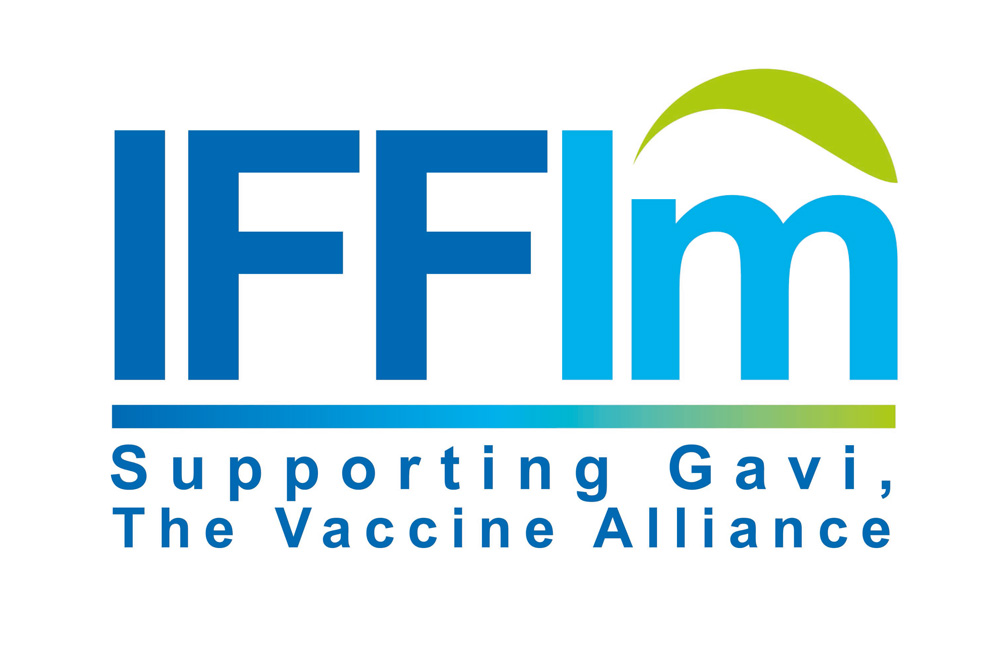Against the clock: Kenyan runner, 15, organises 10km run to beat cervical cancer
- Impact
- Against the clock: Kenyan runner, 15, organises 10km run to beat cervical cancer
Against the clock: Kenyan runner, 15, organises 10km run to beat cervical cancer
18 April 2023
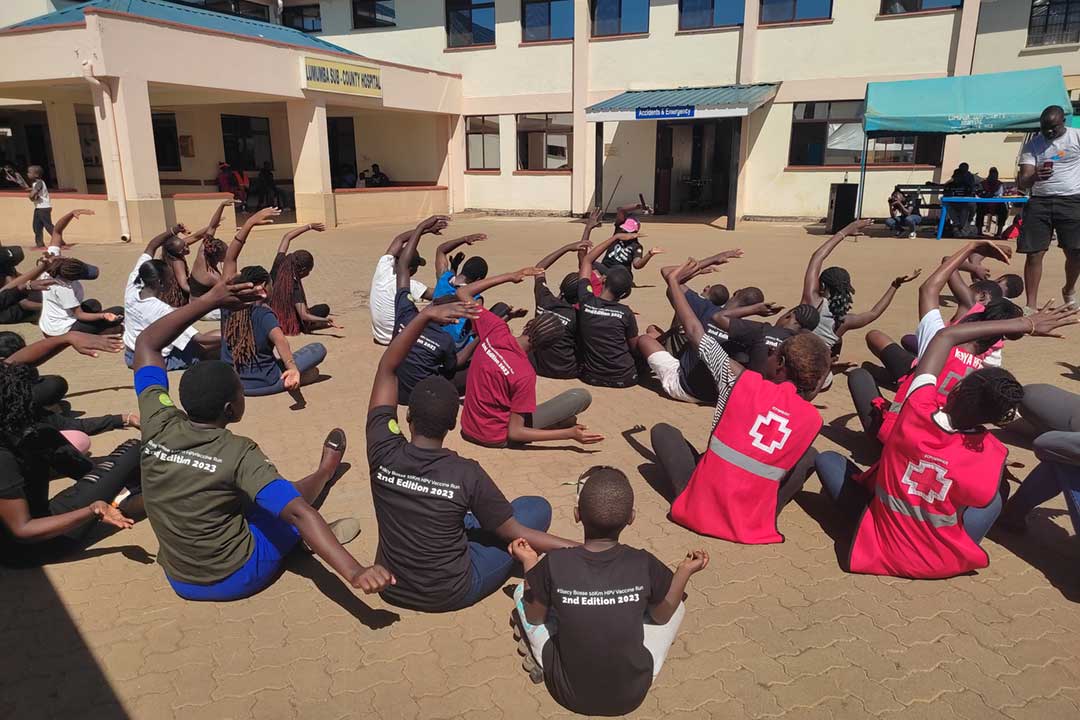
Girls engage in an exercise during the HPV vaccination campaign in Western Kenya Credit: Angeline Anyango
More than 3,200 Kenyan women die of vaccine-preventable cervical cancer each year, but teenage athlete Stecy Bosse of Kisumu is racing to change that.
More than 3,200 Kenyan women die of vaccine-preventable cervical cancer each year, but teenage athlete Stecy Bosse of Kisumu is racing to change that.
Announcements
IFFIm impact: HPV
IFFIm has disbursed nearly US$ 84 million to Gavi for human papillomavirus (HPV) immunisation programmes.
"The cost and burden of living with cervical cancer is quite high for many patients battling the disease," says Stecy Bosse, a teenage athlete from Kisumu county in Kenya, when we ask her why she opted to go for the cervical cancer vaccine in June last year.

It was during a cervical cancer drive aimed at eliminating the dreaded disease that Bosse received her dose of the human papillomavirus (HPV) vaccine.
"The first time my mother asked me to get immunised in 2020, I was scared. The thought of getting pricked by a syringe could not allow me to go," she recalled, as we settled down for an interview.
"Our generation is lucky enough to have the vaccine – let us come out in large numbers to get the vaccine."
– Stecy Bosse
But rather than balk, Bosse says she took the time to do her research and understand why the vaccine was important. What she learned was that cervical cancer is a massive problem in Kenya, where it kills more than 3,200 women a year, but that the vaccine is capable of preventing nearly every case. More than 95% of cervical cancers are a result of the virus the vaccine blocks.
Three years down the line, Bosse is fully vaccinated and determined to spread the word. "I advocate for girls to have the cervical cancer vaccine and those who have the disease to get management drugs," she says.
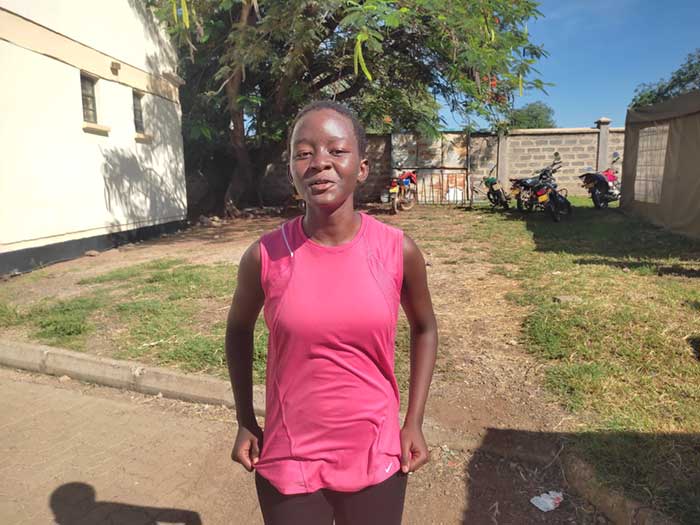
Credit: Angeline Anyango
And that's not just idle talk. On April 15, 2023, Bosse organised the second edition of the Stecy Bosse 10km HPV Run: part middle-distance footrace, part public health carnival, the event saw young girls and their parents run a loop from Lumumba Hospital through Kisumu town, lifting banners and sporting T-shirts that declared: "Prevention starts with me."
By the event's end, a whopping 500 girls had been vaccinated.
"Whenever we go down to the communities and speak to the girls about sexual reproductive health, at times the talks get boring. We, however, thought of cooperating with something sporty to get the girls hyped up and as a result, we have had a good number," says Bosse, an 800m specialist herself.
She reckons that HPV vaccine is a decisive, long-term solution to the disease. "If we do not show up for the vaccine now, we might end up having mere cases of cervical cancer in the future," she says.
The Stecy Bosse run may be the brainchild of one teenaged health campaigner in a hurry, but it fits in with a broader thrust to boost HPV vaccine uptake in this part of the country. The Lake Region Economic Bloc (LREB) First Ladies' HPV vaccine and cervical cancer awareness drive of February 2023, for instance, brought together the wives of 14 Kenyan county governors under a shared campaign banner.
"This is the first campaign of its kind in LREB and is meant to create awareness and updates about this deadly yet preventable disease in the 14 counties," said Kisumu County first lady Ms Dorothy Nyong'o.
Cervical cancer ranks as the second most common cancer among women in Kenya after breast cancer, which means Kenya is harder-hit than average: according to the International Agency for Research on Cancer, cervical cancer is the fourth most prevalent cancer globally among women, with 604,127 new cases recorded in 2020 and 341,831 deaths.
"[We recognise] that with a comprehensive approach to prevention, screening and treatment, cervical cancer can be eliminated as a public health problem within a generation," said Nyong'o.
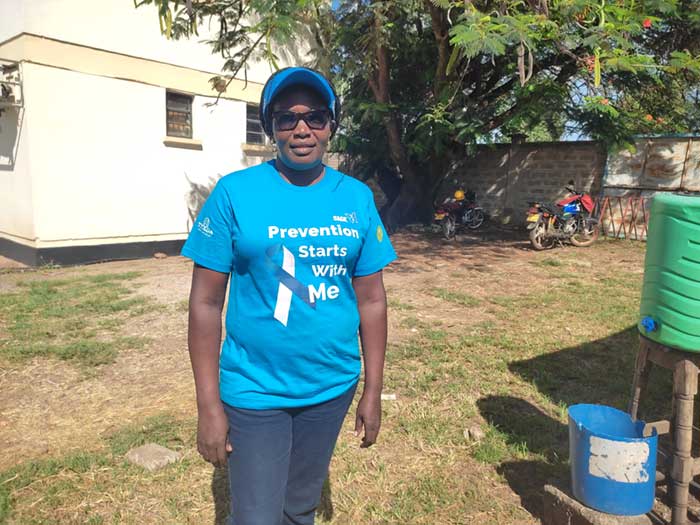
Credit: Angeline Anyango
At the campaign's launch, the first ladies announced that the 14 counties would be offering free cervical cancer screenings. A partnership between UNICEF and National Vaccines and Immunization Program (NVIP) will also see the two bodies supply 850,000 free HPV doses for vaccinations in all public hospitals and clinics.
"We are distributing medical scrubs to health workers to acknowledge them for the amazing work they have been doing and also to give them responsibility of becoming ambassadors of the cervical cancer campaign," said the Nyamira County first lady, Emily Nyaribo, speaking at the launch.
The vaccine is considered effective if administered before exposure to the virus, which is very common, and sexually transmitted.
Kenya recommended the vaccine for 800,000 ten-year-old girls at introduction in 2019. But early uptake was slower than hoped for, with just 33% of the target population receiving the first dose in 2020, and just 16% coming back for dose two.
"The number of teenage pregnancies have continued to rise over the years. Our young girls are exposed to sex at an early age, so their chances of getting the virus are higher," notes Bosse.
"Our generation is lucky enough to have the vaccine – let us come out in large numbers to get the vaccine," she adds.
In Bosse's world, at least, there are signs of positive change. During the first edition of the Stecy Bosse run, the number of those immunised was low, a reason Bosse says was down to lack of awareness. This year, however, the number increased to more than 500. By 2025, Bosse says she is aiming for 10,000 girls vaccinated.
Florence Aketch, Kisumu County department of coordinating immunizations, says the county has immunised 67,000 girls since the launch of the vaccine in 2019. She says that 29,000 of the total number have received their second dose while they are targeting to get to 80,000.
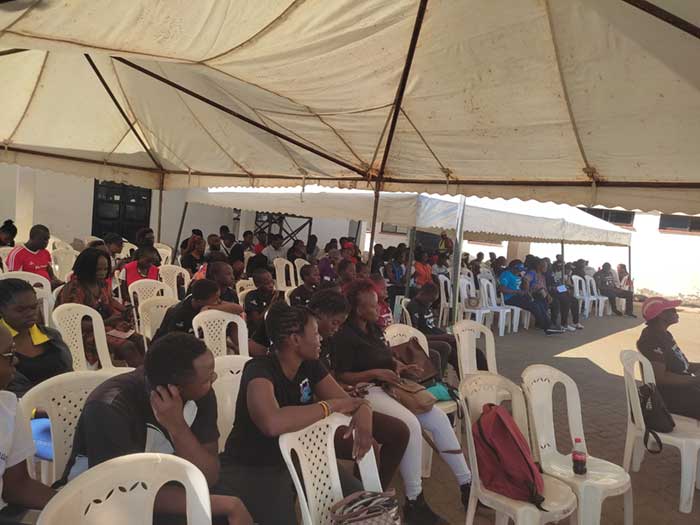
Credit: Angeline Anyango
"We are using different strategies to reach the girls across the 14 counties [of the Lake Region Economic Bloc]. One way is by going to schools, community outreaches and encouraging them to come to our health facilities. We will also be screening girls who come for outpatient treatment to find out any who are due but have not gotten the vaccine," said Aketch.
According to her, the major hurdles facing the programme are fear of the unknown, parents who fail to give their consent to allow the girls to be vaccinated, and lack of information.
The vaccine, she says, has been proven to be effective by the Kenya Pharmacy and Poisons Board. "We are appealing to parents to bring their daughters to take the HPV vaccine in order to lower the disease burden in our country," says Nyong'o.

|
This article is republished from VaccinesWork under a Creative Commons license. Read the original article. |
Share this article
Restricted Access Library
 The material in this Restricted Access Library is intended to be accessed only by persons with residence within the territory of a Member State of the European Union and is not intended to be viewed by any other persons. The material in this Restricted Access Library is provided by IFFIm for information purposes only and the materials contained herein were accurate only as of their respective dates. Certain information in the materials contained herein is not intended to be, and is not, current. IFFIm accepts no obligation to update any material contained herein.
The material in this Restricted Access Library is intended to be accessed only by persons with residence within the territory of a Member State of the European Union and is not intended to be viewed by any other persons. The material in this Restricted Access Library is provided by IFFIm for information purposes only and the materials contained herein were accurate only as of their respective dates. Certain information in the materials contained herein is not intended to be, and is not, current. IFFIm accepts no obligation to update any material contained herein.
Persons with residence outside the territory of a Member State of the European Union who have access to or consult any materials posted in this Restricted Access Library should refrain from any action in respect of the securities referred to in such materials and are otherwise required to comply with all applicable laws and regulations in their country of residence.
By clicking Access restricted content: DYNAMIC-LINK-TEXT I confirm that I have read and understood the foregoing and agree that I will be bound by the restrictions and conditions set forth on this page.
The materials in this Restricted Access Library are for distribution only to persons who are not a "retail client" within the meaning of section 761G of the Corporations Act 2001 of Australia and are also sophisticated investors, professional investors or other investors in respect of whom disclosure is not required under Part 6D.2 of the Corporations Act 2001 of Australia and, in all cases, in such circumstances as may be permitted by applicable law in any jurisdiction in which an investor may be located.
The materials in this Restricted Access Library and any documents linked from it are not for access or distribution in any jurisdiction where such access or distribution would be illegal. All of the securities referred to in this Restricted Access Library and in the linked documents have been sold and delivered. The information contained herein and therein does not constitute an offer for sale in the United States or in any other country. The securities described herein and therein have not been, and will not be, registered under the U.S. Securities Act of 1933, as amended (the "Securities Act"), and may not be offered or sold in the United States except pursuant to an exemption from, or in a transaction not subject to, the registration requirements of the Securities Act and in compliance with any applicable state securities laws.
Each person accessing the Restricted Access Library confirms that they are a person who is entitled to do so under all applicable laws, regulations and directives in all applicable jurisdictions. Neither IFFIm nor any of their directors, employees, agents or advisers accepts any liability whatsoever for any loss (including, without limitation, any liability arising from any fault or negligence on the part of IFFIm or its respective directors, employees, agents or advisers) arising from access to Restricted Access Library by any person not entitled to do so.
"Relief" for mothers in Bayelsa state as malaria vaccine makes waves
07 November 2025
